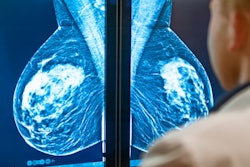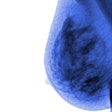
Most women who have knowledge about artificial intelligence (AI) for breast screening have a positive outlook on the technology when it's used alongside radiologists, according to a survey study published October 31 in the British Journal of Radiology.
But a team of investigators led by Dr. Filippo Pesapane, PhD, from the European Institute of Oncology in Milan, Italy, also found that just over half of women considered that both the software developer and the radiologist should be held accountable for AI errors.
"Accountability in the case of AI-related diagnostic errors in screening mammography is still an unresolved issue," Pesapane and colleagues wrote.
Previous research on AI has examined its potential to be used alongside breast imagers -- or even substitute for them -- in breast cancer screening settings. While AI is becoming increasingly adopted into the healthcare enterprise, debate about whether radiologists accept it has risen in recent years.
But what about patients and their perception and acceptance of AI in medicine? Patient opinions aren't clear. Pesapane et al chose breast imaging as a case test to evaluate what women who are eligible for breast cancer screening know about AI and how they perceive it.
The investigators conducted a survey study that included 800 questionnaire responses from both Italian and non-Italian women. Out of the total, 51% of respondents (n = 408) stated they had knowledge of AI, and of these, 88% had a positive opinion on its use in medicine.
The group also found that non-Italian survey respondents reported believing they had a "deep awareness" about AI more often than Italian respondents (odds ratio, 1.91). Higher education levels were tied to more positive opinions on AI"s use in medicine (odds ratio, 4.69).
Most of the women (94%) reported that radiologists should always produce their own report on mammograms, while 77% said that AI should be used as a second reader. However, 52% of respondents (n = 416) suggested that both the software developer and the radiologist should be held accountable for AI errors.
The key question for radiology, along with other medical specialties, is how to convince women to embrace AI for indications such as breast cancer screening, according to Pesapane and colleagues.
"Patients, radiologists, healthcare providers, and policymakers must work together starting from the consideration of patients' values and preferences," they wrote.




















